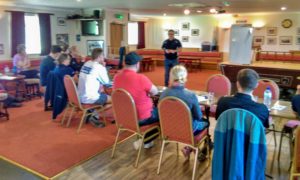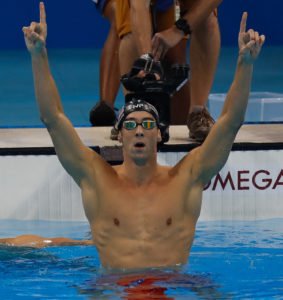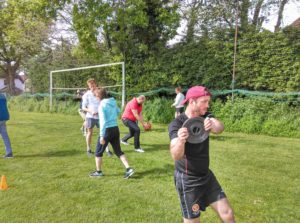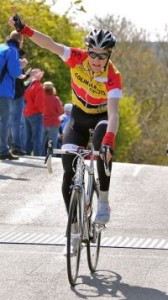Main Menu
Latest Blog Entry
User login
Making Sport Better with Wayne Goldsmith
Coaching the Art and the Heart

Yesterday we hosted the Making Sport Better workshop with Wayne Goldsmith in Willand. He gave two great presentations on coaching today’s generation of athletes, plus answered many questions at the end. Here is a brief summary.
“Coaches are the masters of change”.
Nobody changes by being yelled at or being given pieces of paper and being told “do 6 or 9 of these.” Many coaches assume that the athlete is doing their session with the INTENT that the coach wrote it with. The coach puts thought into the content, science, volume and frequency, but if the athlete does it half- heartedly, then the results will be different from intended.

Wayne constantly illustrated the talk with anecdotes and examples. He talked about watching Michael Phelps doing a simple drop set session with dumbbells in the gym. He had a set each of 40kg, 30kg and 15kg dumbbells. He pressed the heaviest set as many times as he could, and then went to the next set and repeated it. There is nothing complicated about it.
But Wayne said it was how Phelps drove himself and worked. The INTENT was there, so he achieved.
“What is talent?”
Wayne asked this of a very experienced football coach, who thought about it and tapped his chest and said “Ticker.” The heart to drive and succeed and the commitment to the programme.
“I can measure Heart Rate, but I can’t measure Heart.”
Success is a choice that athletes make; the days of yelling and telling are over. So we need to change how we do things. How about rating their skill, saying “that was a 6/10” and seeing how they can improve.
“You can be hard, without being a BastHard”; Wayne talked about having standards and setting them with athletes, the emotion you should show when is coaching is “love and kindness”.
Confidence = belief x evidence

Wayne spent a good part of the session looking at ways of building confidence. The coach’s job is to create an environment and opportunity for people to succeed. He used a diagram of an empty can (I can) and how we can help the athlete fill their can with evidence. This can come from training, from good lifestyle habits and from results.
“Confidence comes from knowing, knowing comes from doing.” If the coach can help the teenager believe in themselves, they will go on and do more.
Wayne said that having the can model and the definition
“confidence = belief x evidence”
gives him something to work with and coach from. Without that model, it becomes too abstract.
“Culture is what you do, not what you say.” It’s about behaviours. By creating a challenging but supportive environment, you help the athlete fill the evidence can to the top.
Guided discovery
I then took the coaches outside to do a warm up activity and introduction to jump training using guided discovery for twenty minutes.
Coaching the athlete: Inspiration not just perspiration

Wayne’s definition of resilience was “It’s not about what happens to you, it’s how you choose to respond.”
He said that definitions of Mental Toughness changed from athlete to athlete and is situation specific (I said that for my daughter it was just getting through the school day sometimes).
Wayne gave the example of a grid he used with a rugby team to identify behaviours that would help improve the team.
| On field | Off Field (Gym) | Game Day | Social | |
| Progression | ||||
| Hard Work | ||||
| Honesty |
The players then identified key behaviours so they see what these words mean in real life to them.
“You have to make the intangible tangible, the unreal real.”
By writing these behaviours down and managing them and getting the athletes to respond, you build a culture of improvement. This then leads to evidence that can be put in the can.
Performance practice
Wayne talked a lot about the myth of technical perfection. He said the model was usually based on elite performers who were outliers. Coaches then became slaves to this myth and thought that mindless repetition will fix a problem.
He then listed 3 stages of learning:
- Skills- teaching
- Mastery– becomes automatic
- Practising under pressure– can they do the skill reasonably well at high speed, or under fatigue or under emotional pressure?
Wayne gave the example of an NRL player who dropped a ball in a big match. The obvious response is to get him to practise high ball catches in training. But this could be only part of the problem. Maybe it was the wet ball. Maybe it was the fear of three 100kg players running at him. Maybe it was the anxiety of the big match.
If we just use repetition in search of perfection, we are only using a quarter of the solution.
Dynamic core
I then took the coaches out to show them a series of progressions of dynamic core work. You can see some of in these two videos:
Summary
We finished with a series of questions to Wayne and I. I didn’t write a full account because I was hosting the workshop. I did find the attendees asked some insightful questions, with a genuine desire to learn.
We tried to offer our advice and experiences, although we definitely don’t have all the answers! I set up this time because it is rare that we get to just chat and discuss problems that we all face. One of the coaches said “I’m glad it’s not just me.”
Wayne was friendly and approachable throughout the day. It was great to see coaches from sports including: handball, basketball, rugby, fencing, equestrianism, tennis, triathlon and cycling, as well as school teachers.
Thanks to everyone who attended and to Willand Rovers F.C. for their hospitality.
Our next course is the one day “Foundation in Athletic Development” for sports coaches and teachers looking to help get their teams ready for next season.
Client Testimonials
 Seb Baylis + Tom Baylis
Seb Baylis + Tom Baylis
"James Marshall is now managing my two sons' strength and conditioning training for a fourth consecutive year. From the very start, youngsters and parents alike have easily engaged with James' professional approach and personable manner. Now both semi-professional cyclists aged 20 and 18, between them they have achieved numerous successes in the National Junior Series, including two stage wins, a silver medal in the National Championships, and selection for team GB in the Junior World Series.
More

